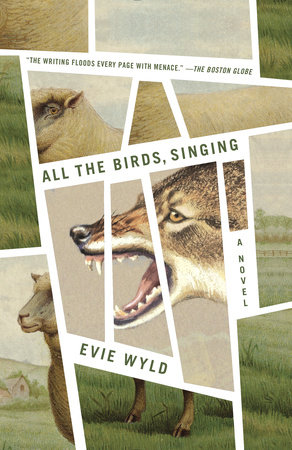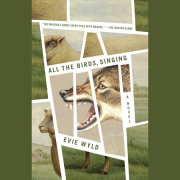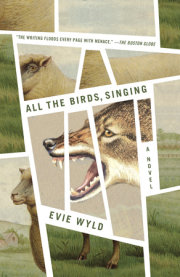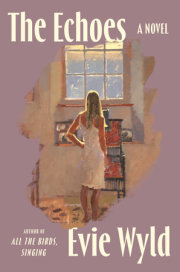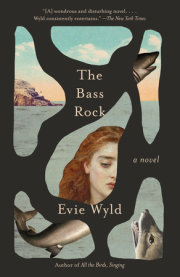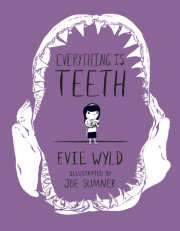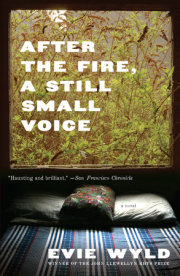From one of Granta’s Best Young British Novelists, a stunningly insightful, emotionally powerful new novel about an outsider haunted by an inescapable past: a story of loneliness and survival, guilt and loss, and the power of forgiveness.
Jake Whyte is living on her own in an old farmhouse on a craggy British island, a place of ceaseless rain and battering wind. Her disobedient collie, Dog, and a flock of sheep are her sole companions, which is how she wants it to be. But every few nights something—or someone—picks off one of the sheep and sounds a new deep pulse of terror. There are foxes in the woods, a strange boy and a strange man, and rumors of an obscure, formidable beast. And there is also Jake’s past, hidden thousands of miles away and years ago, held in the silences about her family and the scars that stripe her back—a past that threatens to break into the present. With exceptional artistry and empathy, All the Birds, Singing reveals an isolated life in all its struggles and stubborn hopes, unexpected beauty, and hard-won redemption.
“Purely gorgeous. . . . Writing with assurance and just enough embedded clues to help us understand what she is doing, Wyld ramps up the tension. . . . In the end, the hardness at Jake’s core and the stubborn isolation she has chosen are undercut by unexpected, softly radiant developments. There’s love as well as dread in this book, a surprising sort of love—the best kind of all.” —Barbara King, Washington Post
“Prepare yourself for an indelible heroine, a fortifying lonesomeness, and a nuanced commentary on what it takes for an outcast girl to survive in an unforgiving world. Wyld’s novel is so bitterly gorgeous you want to linger, and so deeply jarring you want to run away. It deserves to be a modern classic.” —Brian Hurley (Books Editor at The Rumpus) for his blog The Fiction Advocate
“Darkly menacing and quietly terrifying. . . . Gorgeous writing. . . . A must-read for anyone looking for an artful scare. . . . And yet despite all the fear and foreboding, the book’s protagonist is no damsel in distress. . . . As the harsh world seems to circle in around her, the reader will keep on turning pages, heart in her throat, to make sure she keeps on surviving.” —Emma Cueto, Bustle
“Utterly gripping. . . . The book has the brisk pacing of a well-thumbed pocket paperback found in a summer cottage, and yet it’s the sort of book that gets listed as a best book of the year. . . . The success of The Goldfinch was a perfect test case. . . . The mystery of what’s going on with the sheep in All the Birds, Singing, were it the book’s only subject, would make for a fun read on its own. But the sheep are only the beginning.” —Daniel D’Addario, Salon
“Gloriously gruesome [and] lushly visceral. . . . One of the keenest pleasures of this novel is the richness of its animal world. . . . To say that Wyld’s writing makes the art of sheep shearing come alive for the reader may not sound like a particular compliment, but oh, it is—she makes it sing with flea-coated, dung-crusted eloquence. . . . Half of you wants to race through to find out what happens, half wants to pause over the dark, clotted sentences. And then the state of suspense becomes almost unbearable, and you rush through, feeling like you are sprinting through a museum of sinister curiosities, too frightened to linger. . . . The final revelation, when it comes, is explosive.” —Annalisa Quinn, NPR.org (review)
“Wyld makes the ordinary extraordinary. . . . The conclusion of the novel, when the reveal is delivered with a powerful punch, [is] like something out of an Alice Munro story.” —Courtney Allison, Kirkus Reviews (feature)
“Wyld displays a fierce command of language. . . . She tackles a variety of difficult themes—memory and trauma chief among them—with considerable care.” —Charles Shafaieh, Daily Beast
“Gorgeous. . . . The book is remarkable not only for the nearly unbearable sense of suspense, but also for the lushness of the animal world.” —NPR.org (“Best Book Coming Out This Week”)
“Daring and fierce, this is a book that makes you feel the need to look over your shoulder in case something dark and hulking might be gaining on you. . . . From the very first sentence of Wyld’s brilliantly unsettling novel, you’re thrust into a world of violence, dread, and psychological mystery. . . . Where Wyld truly shines is in the writing, flooding every page with menace. . . . Her language is as rattling as it is precise.” —Caroline Leavitt, Boston Globe
“Wyld teasingly leads readers to the mysterious incident Jake is trying to escape . . . [The novel has] an atmosphere pungent with menace and panicked uncertainty . . . Wyld keeps her readers in a blinkered state and then spooks them.” —Sam Sacks, Wall Street Journal
“Gorgeously vivid. . . . Ripe material for a Jane Campion movie or miniserie. . . . Wyld is deserving of recognition.” —Christine Smallwood, Harper’s
“Evie Wyld’s novels ask tough questions without seeking easy answers. . . . Wyld excels in the intimate details that make up the relationship between humans and animals . . . Best of all are Jake’s interactions with dogs in the novel. . . . Despite Jake’s gruff exterior, this is not a book about loneliness or even isolation. There are moments of connection and human kindness. . . . Wyld once again creates a complex character.” —Lauren Bufferd, BookPage
“A riveting novel. . . . Jake is both haunted by the past and struggling with the present, and the intensity of Wyld’s sharp novel grows as the two threaten to collide.” —Leah Strauss, Booklist
“Searing. . . . Wyld’s writing is as muscular as Jake.” —Publishers Weekly
“A book so beautifully written, so alive, so nail-bitingly suspenseful, that at points this reader felt as if the oxygen might be thinning.” —Cornelius Browne, GuardianReaders’ Books of the Year
"One of the best books I read this year was Evie Wyld's darkly beautiful All the Birds, Singing. Wyld twists together the warp and weft of poetic language and plot to create a disquieting, deeply suspenseful novel. It lingered with me long after I finished it."
Hannah Kent, Sydney Morning Herald Books of the YearOne of the best books I read this year was Evie Wyld’s darkly beautiful All the Birds, Singing. Wyld twists together the warp and weft of poetic language and plot to create a disquieting, deeply suspenseful novel. It lingered with me long after I finished it.” —Hannah Kent, author of Burial Rites, in Sydney Morning Herald Books of the Year
“Completely and utterly monumental.” —BBC Radio 4
“A tremendous achievement. . . . A dark, powerfully disturbing and beautifully observed story . . . almost Nabokovian in its structural intricacy.” —William Boyd,New Statesman
“Outstanding . . . Evie Wyld is the real thing. . . . She reconfigures the conventions of storytelling with a sure-footedness and ambition which belie her age. . . . Quite as good as Ian McEwan’s early fiction.” —The Spectator
“Extraordinarily accomplished, one of those books that tears around in your cerebellum like a dark firework, and which, upon finishing, you immediately want to pick up again.” —Financial Times
“Absolutely gorgeous. . . . Wyld’s heroine, Jake, is like Hemingway’s Nick Adams in toughness and silence, but she has a far more terrifying history, and her story now is edged by greater threat. You won’t be able to stop reading.” —David Vann, author of Legend of a Suicide
“Ingeniously constructed.” —Literary Review
“A riveting novel. . . . Jake is both haunted by the past and struggling with the present, and the intensity of Wyld’s sharp novel grows as the two threaten to collide.” —Booklist
“An intensely involving tale of survival, shot through with Wyld’s distinctive wit. . . . An indelible and atmospheric novel that will have the hairs on the back of your neck working overtime.” —Daily Mail
“For once, the hype matches the talent. . . . Wyld’s writing seems to come from somewhere deep somewhere a little bit unnerving.” —The Sunday Times (London)
“It’s the quality of Wyld’s prose that really blows your mind.” —Metro
“One of the best books I read this year was Evie Wyld's darkly beautiful All the Birds, Singing. Wyld twists together the warp and weft of poetic language and plot to create a disquieting, deeply suspenseful novel. It lingered with me long after I finished it." —Hannah Kent, Sydney Morning Herald
“Searing. . . . Wyld’s writing is as muscular as Jake.” —Publishers Weekly
“Wyld [is] a writer of exceptional talent . . . a distinctive and important new voice.” —Irish Times
“Vividly drawn. . . . When the birds do ‘sing,’ and Jake’s primal tragedy is revealed, it is clever and very unexpected indeed.” —The Guardian
“Unsettling, beautiful, horrifying and moving in equal parts. . . . In the flawed but vulnerable character of Jake, Wyld’s created someone you can’t help but care for, root for and desperately want the best for . . . There is no disputing the power of the story and the beauty of Wyld’s writing. It’s an extraordinary book.” —Stylist
“One feels the influence of an early Ian McEwan or Iain Banks. . . . But All the Birds, Singing is also powerfully original.” —Times Literary Supplement (London)
“Tim Winton is a writer with whom the fearless Wyld deserves serious comparison.” —Daily Telegraph
“Wyld’s work has been compared to that of Cormac McCarthy for the mythic qualities they share, but it is in the continuity of peoples, places and customs that the two are bound together tightest.” —The Skinny

